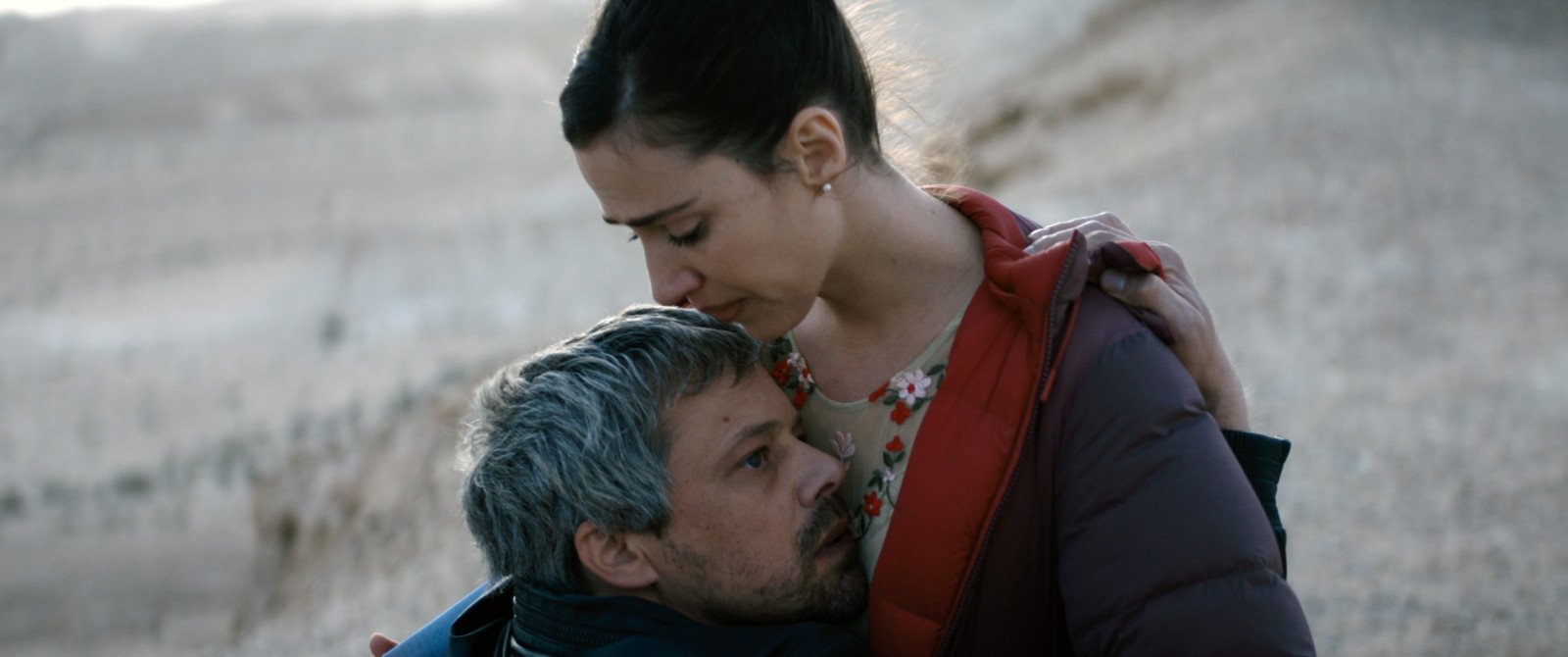Ahed’s Knee: An Israeli Filmmaker Loses It In The Desert
By Liam Lacey
Rating: A
It’s extraordinary how much outrage can be caused by a slap in the face, isn’t it?
That age-old gesture, designed more to humiliate than injure, is part of the background of Ahed’s Knee, a film by Israeli filmmaker Nadav Lapid (he made the 2018 Berlin winner Synonyms). It’s a film of jagged edges and erratic momentum, tracing a day in the life of a filmmaker undergoing a personal and political crisis.
Lapid’s film takes its title from Ahed Tamimi, a 17-year-old Palestinian girl who, in 2017, appeared in a viral video in which she struck an Israeli soldier across the face. She had recently learned that her 15-year-old cousin had been severely wounded with a rubber bullet to the head during a violent protest.
Ahed served eight months in jail for her crime and her mother was also imprisoned for posting the video. Afterward, Bezalel Smotrich, leader of the Religious Zionist Party, tweeted: “In my opinion, she should have gotten a bullet, at least in the kneecap. That would have put her under house arrest for the rest of her life.”
In Lapid’s film, the story of Ahed’s slap and the politician’s brutal response are the subject of a video project in development by a filmmaker, known simply as Y (Avshalom Pollak). A successful arthouse director, Y looks like a middle-aged rock’n’roller in his leather jacket and tousled greying hair.
He’s both macho and emotionally vulnerable, as he sends home video messages to his terminally ill mother, who was also his screenwriting collaborator. (Director Navid’s mother and editor, Era Lapid, died shortly before Ahed’s Knee was made).
While juggling calls back to Tel Aviv, Y travels for an overnight trip to a remote desert village in southern Israel for a library screening of one of his older films. The film takes place over the afternoon of his visit and the evening’s screening.
Y’s handler for the evening is a sunny, flirtatious young library director and a fan, Yahalom (Nur Fibak) and they almost immediately seem entangled in each other’s personal space, like lovers or perhaps wrestlers. As they recline on a sofa together, it seems a foregone conclusion they will embark on a romance, or at least a fling — but perhaps Yahalom has an agenda in being so easily intimate.
There’s one issue that must be resolved before the filmmaker can be paid: the ministry of culture requires he signs a self-censoring form, agreeing to speak only on “acceptable subjects” none of which include words like “Palestinian” or “occupation.”
Yahalom calls it a formality but as Y keeps delaying the signature, he grows angrier at what he views as the censorship and degradation of Israeli culture. On a trip to the desert to visit a water-filled crevasse, he tells her about the absurd, mind-breaking games he underwent in an intelligence unit in the army. When she says he seems to be suffering from combat trauma, he corrects her. He was never in combat, just in the military. He later quotes his mother, saying there are “no survivors” in Israel.
But Y has an agenda too, to force Yahalom to admit that the government she works for is the enemy of free cultural expression and to use it against her. By the film’s end, he’s like a modern prophet, condemning how his people have gone astray, to the point he wants to “puke Israel out with a scream.”
Of course, Navid — who made this frenetic but urgently crafted film —is not the same person as his irascible protagonist, a man who seems to be on the verge of personal and career self-destruction. At one point, before his library screening, Y tells the small audience, which consists mostly of Yahalom’s friends and family, to “pay attention to the style.”
That’s also good advice here, as Shai Goldman’s camera whips and jolts about, pressing close to bodies or framing the arid landscape in wide shots as editor Nili Feller smashes disparate elements together, from pop-up musical numbers, tableaux, choreographed flashbacks.
Ultimately, the edge that Navid is pushing is less to do with a rant against the Israeli government than in creating a cinematic depiction of a tortured psychological state, in both the individual and collective meanings of that word.
Ahed’s Knee. Written and directed by Nadav Lapid. Starring Avshalom Pollak, Nur Fibak, Yoram Honig, Lidor Ederi, Yonathan Kugler, Yehonathan Vilozni, Naama Preis. Opening April 1 in Toronto at the TIFF Bell Lightbox.


